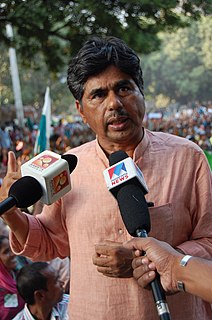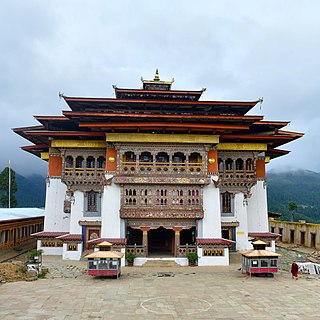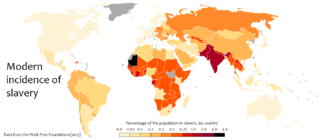
Manorialism, also known as the manor system or manorial system, was the method of land ownership in parts of Europe, notably France and later England, during the Middle Ages. Its defining features included a large, sometimes fortified manor house in which the lord of the manor and his dependents lived and administered a rural estate, and a population of labourers who worked the surrounding land to support themselves and the lord. These labourers fulfilled their obligations with labour time or in-kind produce at first, and later by cash payment as commercial activity increased. Manorialism is sometimes included as part of the feudal system.

The Ibibio people are a coastal people in southern Nigeria. They are mostly found in Akwa Ibom and Cross River States. They are related to the Annang, and Efik peoples. During the colonial period in Nigeria, the Ibibio Union asked for recognition by the British as a sovereign nation.
A lineage-bonded society is a type of acephalous society predicated on claims of a common ancestor.

Rural society in the People's Republic of China encompasses less than half of China's population and has a varied range of standard of living and means of living. Life in rural China differs from that of urban China. In southern and coastal China, rural areas are developing and, in some cases, statistically approaching urban economies. In northwest and western regions, rural society is still perceived as lowly and primitive. Basic needs such as running water and accessible transportation are a problem in these areas.

Sande, also known as zadεgi, bundu, bundo and bondo, is a women's initiation society in Liberia, Sierra Leone, Guinea and the Ivory Coast. The Sande society initiates girls into adulthood by rituals including female genital mutilation. It is said by its supporters to confer fertility, to instill notions of morality and proper sexual comportment, and to maintain an interest in the well-being of its members throughout their lives.

The Chewa are a Bantu ethnic group native to central and southern Africa and the largest ethnic group in Malawi. The Chewa are closely related to people in surrounding regions such as the Tumbuka and Nsenga. They are historically also related to the Bemba, with whom they share a similar origin in the Democratic Republic of the Congo. As with the Nsenga and Tumbuka, a small part of Chewa territory came under the influence of the Ngoni, who were of Zulu or Natal/Transvaal origin. An alternative name, often used interchangeably with Chewa, is Nyanja. Their language is called Chichewa. Internationally, the Chewa are mainly known for their masks and their secret societies, called Nyau, as well as their agricultural techniques.

The Tapirapé indigenous people is a Brazilian Indian tribe that survived the European conquest and subsequent colonization of the country, keeping with little changes most of their culture and customs. Stationed deep into the Amazon rainforest, they had little direct contact with Europeans until around 1910, and even then that contact was sporadic until the 1950s.
The Dan are a Mande ethnic group from northwestern Ivory Coast and neighboring Liberia. There are approximately 700,000 members of the group and their largest settlement is Man, Ivory Coast. Neighboring peoples include the Krahn, Kpelle and Mano. They are officially known as Yacouba in Ivory Coast. In Liberia, they are also known as Gio, which is considered a derogatory exonym.
Kamaiya and Kamlari were two traditional systems of bonded labour practised in the western Terai of Nepal. Both were abolished after protests, in 2000 and 2006 respectively.
The Sso was an initiation rite practiced by the Beti of Cameroon in the 19th and early 20th centuries. The participants were young men between 15 and 25 years of age who, by completing the rite, became adults and enjoyed added privileges, such as passage into land of the ancestors at death. Each boy was sponsored by an esia Sso. The sponsor of the rite was a village headman; he was expected to provide food and lodging for guests and to pay for several large feasts during the rite's six-month duration. Other important figures were the zum loa, who revealed past sins that the sponsor had committed and which would be expiated by the rite's completion, and the mfek Sso, who organised and administered the rite.

Rostamkela is a city in the Central District of Behshahr County, Mazandaran Province, Iran. At the 2006 census, its population was 11,306, in 3,055 families.

Rajagopal P. V., is an Indian Gandhian activist, is a former Vice Chairman of the Gandhi Peace Foundation, New Delhi. and the president and founding member of Ekta Parishad, Rajagopal started working alongside Gandhian stalwarts J.P. Narayan and Subba Rao to disarm 578 dacoits (outlaws) in Chambal region of India in 1972. Thereafter the young Gandhian turned away from dealing with direct violence and toward the people of Adivasis, bonded labourers and other landless communities affected from poverty and exploitation.

The Gangteng Monastery, generally known as Gangtey Gonpa or Gangtey Monastery, is an important monastery of Nyingmapa school of Buddhism, the main seat of the Pema Lingpa tradition. located in the Wangdue Phodrang District in central Bhutan. The Monastery, also known by the Gangten village that surrounds it, is in the Phobjikha Valley where winter visitors – the black-necked cranes – visit central Bhutan to roost, circling the monastery three times on arrival and repeating this circling when returning to Tibet. The Monastery's history traces to the early 17th century and back to the prophecies made by the well-known Terton Pema Lingpa in the late 15th century.

The Ganda people, or Baganda, are a Bantu ethnic group native to Buganda, a subnational kingdom within Uganda. Traditionally composed of 52 clans, the Baganda are the largest ethnic group in Uganda, comprising 16.5 percent of the population at the time of the 2014 census.
Village Bonded Societies are the largest classification of acephalous societies. They differ from lineage-bonded societies and land-bonded societies mainly in that they are large enough to support both secret societies and age sets.

Debt bondage in India or Bandhua Mazdoori was legally abolished in 1976 but remains prevalent due to weak enforcement by the government. Bonded labour is a system in which lenders force their borrowers to repay loans through labor. Additionally, these debts often take a large amount of time to pay off and are unreasonably high, propagating a cycle of generational inequality. This is due to the typically high interest rates on the loans given out by employers. Although debt bondage is considered to be a voluntary form of labor, people are forced into this system by social situations.

The Kharam are a tribal people located in the state of Manipur, India. They are listed as a Scheduled Tribe, in accordance with The Scheduled Castes and Scheduled Tribes Orders (Amendment) Act, 1976 Indian Constitution.
Liu Shiduan was the founder and leader of the Big Swords Society, a martial arts society whose main task was to protect the property of landowners in Caozhou prefecture in late Qing China.











